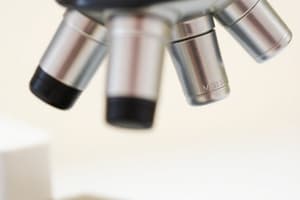Podcast
Questions and Answers
Which of the following accurately defines resolution in microscopy?
Which of the following accurately defines resolution in microscopy?
- The ability of a microscope to differentiate between two close objects. (correct)
- The size of the field of view when using a microscope.
- The overall brightness of the image seen through the microscope.
- The total magnification achieved by the microscope.
What unit is primarily used for measuring volume in the metric system?
What unit is primarily used for measuring volume in the metric system?
- Gram
- Millimeter
- Meter
- Liter (correct)
Which process explains the increase in acidity as the pH value decreases?
Which process explains the increase in acidity as the pH value decreases?
- Each whole number decrease in pH results in a tenfold increase in acidity. (correct)
- An exponential increase in hydroxide ions.
- A linear increase in acidity per pH level.
- A doubling of acidity levels with each pH decrease.
In the context of scientific experiments, what distinguishes the dependent variable from the independent variable?
In the context of scientific experiments, what distinguishes the dependent variable from the independent variable?
Which of the following statements accurately describes monomers and polymers?
Which of the following statements accurately describes monomers and polymers?
Flashcards are hidden until you start studying
Study Notes
Microscope Fundamentals
- Resolution: The ability to distinguish between two separate points.
- Total magnification: Multiply the magnification of the objective lens by the magnification of the eyepiece.
- Field of view: The area visible through the microscope. Lower magnification has a larger field of view.
- Meniscus: The curved upper surface of a liquid in a tube.
Scientific Method
- Parts of the scientific method: Observation, hypothesis, prediction, experiment, analysis, conclusion.
Units and Conversions
- Base units: Meter (length), gram (mass), liter (volume), Celsius (temperature).
pH
- Acids: Donate hydrogen ions (H+).
- Bases: Accept hydrogen ions (H+).
- pH scale: A logarithmic scale that measures the acidity or alkalinity of a solution. A difference of one pH unit represents a tenfold difference in acidity or alkalinity.
Biomolecules
- Monomers: Small building blocks of molecules.
- Polymers: Large molecules made up of repeating monomers.
Skulls
- Bipedal skeletons: Have a foramen magnum (opening for the spinal cord) positioned underneath the skull, indicative of upright walking.
Biomolecule Tests
- Carbohydrate test: Positive results show a change in color (usually to a reddish-purple or blue). Negative results show no color change.
- Lipid test: Positive results show a milky or cloudy appearance in the solution. Negative results show no change.
- Protein test: Positive results show a dark purple or blue color. Negative results show no color change.
Experiment Design
- Independent variable: The factor that is changed in an experiment.
- Dependent variable: The factor that is measured or observed in an experiment.
- Control group: A group in an experiment that does not receive the treatment, used as a baseline for comparison.
- Control variable: A factor that is kept constant in an experiment to ensure fair testing.
Scientific Notation
- Scientific notation: A way to express very large or very small numbers using exponents.
- Conversion to standard notation: Move the decimal point based on the exponent value.
- Operations with scientific notation: Multiply or divide by multiplying or dividing the base numbers and adding or subtracting the exponents.
Carbon Skeletons
- Carbohydrates: Have a carbon backbone with attached hydroxyl groups (-OH).
- Lipids: Have a carbon backbone with attached fatty acid chains.
- Proteins: Have a carbon backbone with attached amino acid side chains.
Studying That Suits You
Use AI to generate personalized quizzes and flashcards to suit your learning preferences.




